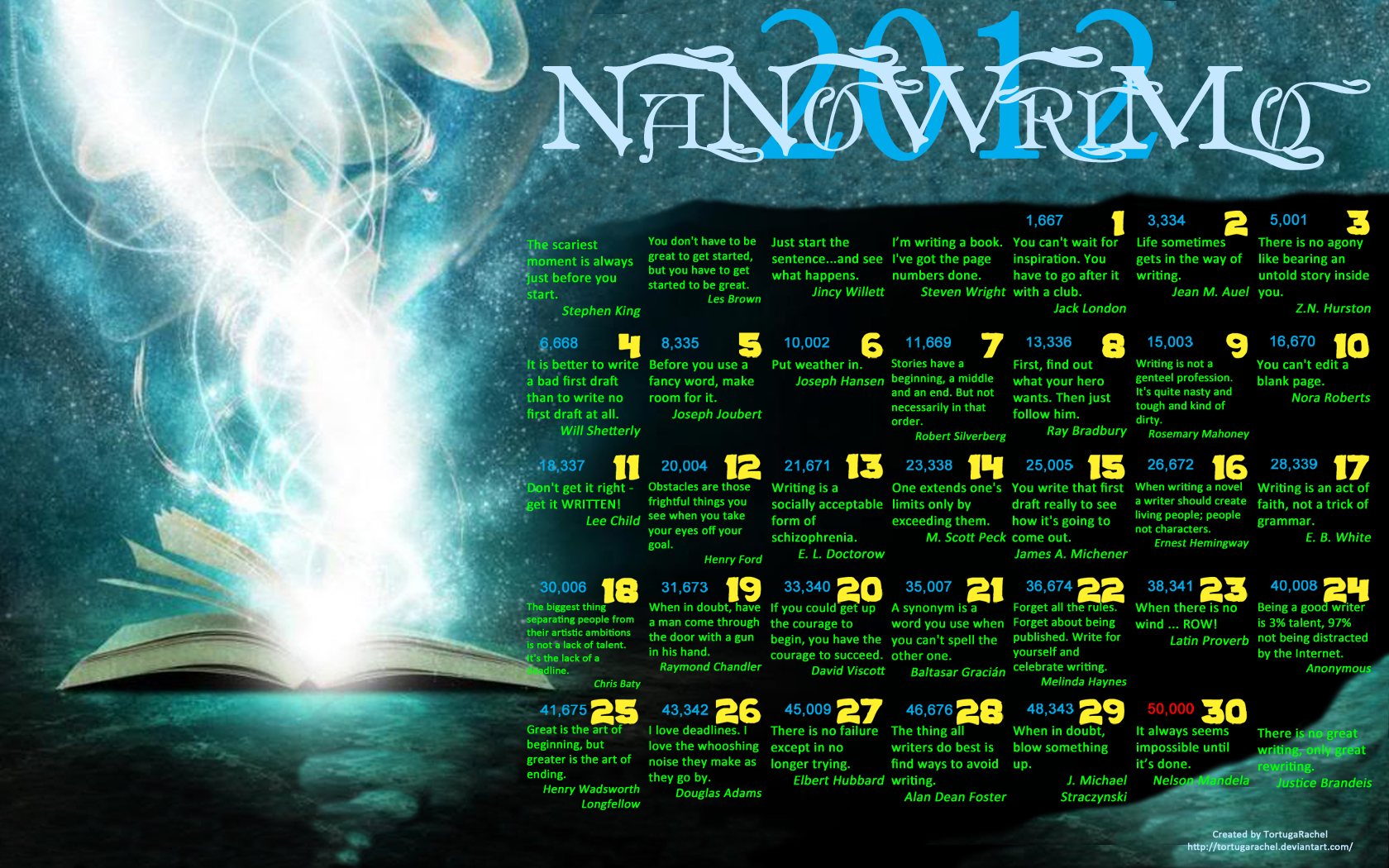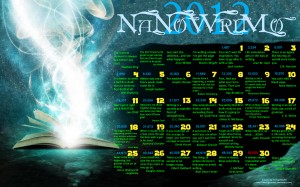In 20 days, I became a ‘winner’ of the NaNoWriMo Challenge by writing 50,000 words for my novel.
Here are 10 practical steps that helped me win…
1. Be prepared. Create an outline.
Before November, I prepared an open-ended outline. Each chapter was concisely summarized in a few sentences with lots of room to spare and change. Occasionally, I would add more sub-bullet points if it would help explain the important little details.
With an outline, you are creating the essential dots of your novel. When writing, the fun part is connecting those dots. And oftentimes, while connecting a dot, you create an entirely new dot with new possibilities. Does this set you back? Perhaps. But good ideas are worth exploring.
2. Focus on the daily goal. Not the whole enchilada.
My goal was to write at least one decent chapter each day because I knew my novel would not exceed 30 chapters. And if I finished one chapter early, I would restrict myself from writing the next chapter until my original chapter was decent enough to read.
‘Decent’ is a subjective word. But for me, it means good enough to be read as a draft, and with enough details and hints of what might need to be edited later on. Once I felt a chapter obtained that decency standard from my daily writing, only then did I move on to the next chapter. Thankfully, a decent chapter would yield 2,000 to 4,000 words keeping me way ahead of the minimum NaNoWriMo daily word quota of 1,667.
3. Get buy-in from those that affect your time and energy.
In order to invest time in your dream novel, you must communicate the importance of this project with those that depend on you. Make a plan that works for both your novel’s goals and your loved ones.
Without their support, you will find that writer’s block, lack of creativity and developing your writing craft will be the LEAST of your worries. It is never fun to have the desire, energy and willpower to write but no actual freedom to do so. At the same time, sacrificing your family, career and other higher priorities for this dream project won’t do you much good either.
What’s so great about success if you have no one to share it with?
4. Make a consistent schedule and logistical plan to achieve your daily goal.
A goal is totally possible if you have the logistics and freedom to act on it. For me, I did my very best to dedicate at least 4 hours a day to writing. Sometimes, I got lucky and wrote 6 to 8 hours a day, where I can write 2-3 chapters.
I also made sure I would be writing in an environment free from distractions. If you write well in a completely isolated vacuum of space, go for it. Me, on the other hand, I would get too paranoid. What if I suffered a seizure or someone mugged me when I was all alone in a very quiet desolate room? No, I like to be around people. Busy people who won’t bother me. Coffee shops are excellent places for that, especially when I bring my headphones so I don’t have to listen to any gossip. Plan ahead. Use Yelp to find the best locations that suit your needs in completing your novel.
5. Surround yourself with people who believe in you.
I don’t have many friends who write or even read books for fun. But when I joined the NaNoWriMo community, I was overjoyed to meet so many like-minded folks who are actually serious (and oftentimes successful) in writing their novels. Many of them have become my accountability partners and cheerleaders for each day I focus on my goals. Just knowing that they are rooting for me adds more fuel to the fire. On several occasions, I felt like taking a break or stopping the writing. But then on my twitter feed, I see these people still hacking away and celebrating their daily goals. This positive energy is contagious. I ended up writing an additional 500 to 1,000 words when I told myself it was okay to quit for the day.
Find a community that helps you achieve your dreams. If not face-to-face, then the Internet is your friend. But be wary of Step 6.
6. Focus. The Internet is a trap.
If you’re going to write anything, write your novel. Don’t write on Facebook. Don’t email your friends. Don’t write a blog post. Write your freaking novel.
I’ve seen several writing buddies who complain about not being able to meet their daily word count quotas. But then I see them tweeting. And then promoting their lengthy blog articles. All that time and energy spent could have gone to their novel. Take a break as often as you need but if you’re not content with your writing sessions, something has to give.
7. Don’t get it right. Get it written!
That’s a direct quote from Lee Child. No matter how good you are at writing, your first attempt will always fall short under what you consider your best writing. Just get that crap written first. And then refine later.
“There is no great writing, only great rewriting.” – Justice Brandeis
“You can’t edit a blank page.” – Nora Roberts
“Writing is when we make the words. Editing is when we make them not sh*tty.” – Chuck Wendig
So just get your first draft on paper. And seriously, don’t share it yet. You’re most likely going to revise that piece of crap many times over until it finally becomes worthy to be read. Your proof readers and friends will thank you.
8. Be flexible. Be patient. Stay positive.
Life happens. And your writing will inevitably suffer. But difficult seasons and obstacles are temporary. Remember that.
For four days of November, my 9-month old twins needed me when I couldn’t find any extra hands to help out. My son was yakking out of his nose for 2 days straight. I spent the majority of time at the pediatrician’s office and holding my son. And then I would pray for him, doing everything in my power to be the best dad I can be.
Needless to say, my writing lost its momentum but that fact did not stress me out. I knew that once things got better (they always do!), I would be given opportunities to focus and write again. I clung to that hope and when the time finally came, I was excited, relieved and pumped up to write once more. If I stressed and moped around during that time, I would only be meditating on negative energy. Negative people are never fun to hang out with. Stay flexible. Be gracious. Your loved ones will thank you for that.
9. Leverage advice that works for you. Avoid everything else like the plague.
Not every piece of writing advice will work for you. Ignore the ones that distract you from writing. Run away from anything that stresses you out and discourages you. Focus on what delivers words on the paper. One piece of advice that never appealed to me was to never edit during NaNoWriMo. I do not have faith in my first attempt at any chapter. In fact, I cringe to see what I initially write and think how God-awful of a writer I am to throw such crap on paper.
So I took Step 2 very seriously. I hate to write crap that I would never use later when editing. So when I finished a really crappy chapter, and if time allowed, I edited it to make refined crap. Yes, refined crap is always better than crap. My future editor-self will thank me later. Again, this is what worked for me. It may not work for you.
10. Do not give up.
You may think your novel sucks. And it does on the first draft. But if you refer back to Step 7 and Step 9, editing will be your friend. Unless you truly believe your novel has absolutely no redemptive value, keep your head up. So stop being so negative and pay close attention to Step 2 and Step 8.
“There is no failure except in no longer trying.” – Elbert Hubbard.
You will hit obstacles but your creative mind will find a way to achieve your daily goal. Just keep at it.
“It always seems impossible until it’s done.” – Nelson Mandela
—
If you’re wondering where I found all these wonderful quotes, I suggest downloading this well-designed NaNoWriMo calendar by TortugaRachel.
To all fellow writers, good luck to you. Writing isn’t for everyone and that is why anyone who actually tries has my respect.

